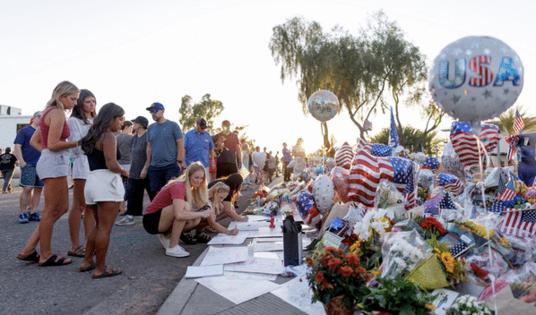Commentary: To stop political violence, stop hating on others
Published in Op Eds
You’re deploying hateful language! You’re encouraging political violence!
Now, please excuse me while I do the same thing.
Welcome to the new American berserk, to borrow Philip Roth’s memorable phrase. We’re going crazy by denouncing violent rhetoric by others, even as we engage in it ourselves.
Witness President Donald Trump’s statement after conservative activist Charlie Kirk was assassinated on Wednesday. “It’s long past time for all Americans and the media to confront the fact that violence and murder are the tragic consequence of demonizing those with whom you disagree day after day, year after year, in the most hateful and despicable way possible,” Trump said.
Then he went on to blame the “radical left” for Kirk’s murder, as well as for the attempt last year made on Trump’s life in Butler, Pennsylvania. Never mind that the Butler shooter was a registered Republican and that Kirk’s murderer hasn’t been conclusively identified. (Law enforcement officials took a suspect into custody on Friday, but we don’t know his politics.)
In other words: Trump demonizes people he disagrees with, in the most hateful and despicable way.
And he’s been doing it for years, of course. He calls his opponents scum, lowlifes, animals, losers and hundreds of other slurs.
He urged supporters at a Trump rally to“knock the crap” out of hecklers. He praised a GOP congressman who body-slammed a reporter.
Other Republicans — including Kirk— have promoted the“great replacement theory,” which warns that white Americans are being overrun by nonwhite people and immigrants. That’s what reportedly motivated a white man to kill 10 African Americans at a Buffalo, New York, grocery store in 2022. Likewise, the man who killed 23 people in 2019 at an El Paso, Texas, Walmart — which served mostly Hispanic customers — said he was “defending my country from cultural and ethnic replacement.”
Does that mean Kirk and other GOP replacement theorists were responsible for these murderous assaults? Of course not. But surely demonizing immigrants and racial minorities — day after day, year after year — makes violence against them more likely to occur.
So does calling Trump a Nazi or a fascist, as some people on the left are wont to do. Fascists don’t believe in democracy; they can only be dislodged with violence. And according to a survey earlier this year by Robert Pape, America’s leading authority on political violence, 39% of Democrats agreed that removing Trump from office by force is justifiable.
So we shouldn’t be surprised when some people actually take up arms against him or his allies. Consider the man arrested in 2022 for attempting to kill Supreme Court Justice Brett Kavanaugh out of fear that the court would overrule Roe v. Wade (which it did, a few weeks later). And let’s not forget the 2017 shooting of Republican House Majority Whip Steve Scalise, by a man who was upset about Trump’s victory the previous year. “It’s time to destroy Trump & co.,” the shooter posted on social media.
You might argue that Trump has exhibited authoritarian behavior, and you might be right. But calling him a fascist or Nazi isn’t an argument; it’s a slur, just like the insults that Trump tosses around. And for some listeners, it will be an invitation to violence. Investigators reportedly found“hey fascist! catch” engraved on a casing recovered with the rifle they suspect was used to kill Kirk.
We need to end this madness, right now, or more people will die. That doesn’t mean creating new laws or restrictions around speech, which could be used by Trump — or anyone else in power — to muzzle voices and ideas they don’t like.
Instead, we need to raise our own voices against violent rhetoric of every kind. And, most of all, we need to refrain from engaging in it ourselves. We’re demonizing the other side, day after day, in a hateful and despicable way. We must stop. All of us.
That’s why I was glad to see Republican U.S. Sen. Markwayne Mullin and Democratic U.S. Rep. Josh Gottheimer on TV after the Kirk assassination, pleading with Americans to stop hating on each other. “It’s all of our faults, right?” Mullin said. “If you stir a fire, coals are going to come out of it. If you pour gasoline on a fire, it’s going to explode.”
Gottheimer agreed. “What we need to do is take the temperature down,” he urged. “We have to get back to actually talking to one another.”
The choice is ours, dear Americans. We can continue to pour gasoline on a fire, which will spark more tragic violence like Kirk suffered. Or we can take the temperature down, and get back to talking.
What do you want to do?
____
Jonathan Zimmerman teaches education and history at the University of Pennsylvania and serves on the advisory board of the Albert Lepage Center for History in the Public Interest.
___
©2025 Chicago Tribune. Visit at chicagotribune.com. Distributed by Tribune Content Agency, LLC.
























































Comments